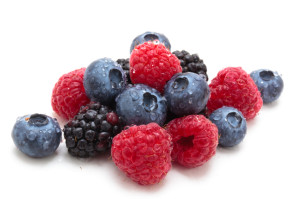One in every seven Americans older than 71 years of age has some form of dementia. The most common form is Alzheimer’s disease which affects more than 24 million people worldwide. In addition to adopting a regular exercise regimen and maintaining a healthy body weight, certain foods/food groups may reduce your risk of memory-related problems and neurological decline. Read on to learn about 10 tips that may help your brain stay sharp and focused!
#1: Aim for at least 7 servings of fruits and vegetables daily. Berries specifically are an excellent source of antioxidants and anthocyanins. These compounds help protect brain cells from toxins, improve the use of glucose in the brain and promote communication between brain cells.
#2: Eat several servings of fatty fish, such as salmon, mackerel and tuna each week. Omega-3’s found in fatty fish help maintain the myelin sheath that covers the brain cells and helps increase the speed and efficiency of communication impulses. Low levels of DHA, an omega-3 fatty acid, can result in memory loss, lack of concentration and mood disturbances.
#3: Reduce intake of red meat to limit the level of homocysteine in the blood. Homocysteine is an amino acid that has a potential negative link to Alzheimer’s disease. If you do prefer beef, always choose extra lean varieties which contain iron without the extra fat. Iron may improve memory, alertness and attention span.
#4: Make sure to get adequate vitamin D either by sunlight or through dietary sources. Experts recommend 10 to 15 minutes of sunlight a day on the arms and legs whenever possible. However, individuals living north of Tennessee can only rely on sun sources from May to October. Foods rich in vitamin D include fortified milk, cheese, butter, margarine, oysters, cereal, eggs and tuna.
#5: Consume more vitamin E rich foods for their antioxidant qualities. Soybean oil, safflower oil, cottonseed oil, wheat germ, whole grains, green leafy vegetables, nuts and seeds are good sources of vitamin E. In addition to vitamin E, cashews contain magnesium that allows more oxygen into the blood cells in the brain. Aim for one ounce of a variety of nuts daily.
#6: Drink black or green tea which provides an excellent source of antioxidants.
#7: Folic acid decreases the body’s level of homocysteine. This vitamin is found in green leafy vegetables, wheat bran, beets, tomatoes, whole grains, fortified cereals and citrus fruits. In addition, citrus fruits contain vitamin C and other antioxidants that help maintain sharp memory and help the brain cells resist damage.
#8: Individuals with low levels of vitamin B12 have increased brain shrinkage as they age. Similar to folic acid, B12 also assists in decreasing homocysteine levels. Foods rich in B12 include lean meat, milk, and eggs.
#9: Many elderly people are deficient in zinc which plays a role in memory. Best sources of zinc are meat, shellfish, poultry, milk and milk products. Chicken is also high in tyrosine, an amino acid required for the production of the alertness chemicals dopamine, epinephrine and norepinephrine. When your brain is producing these, you think and react more quickly, and feel more motivated, attentive and mentally energetic.
#10: Enjoy coffee. Freshly-ground coffee beans are rich in vitamins, minerals, antioxidants, and amino acids. Several studies have shown that regular coffee consumption can reduce the risk of dementia. Keep in mind that it is important to drink coffee in its purest form. Combining it with fattening creamers or sugar is counterproductive.

